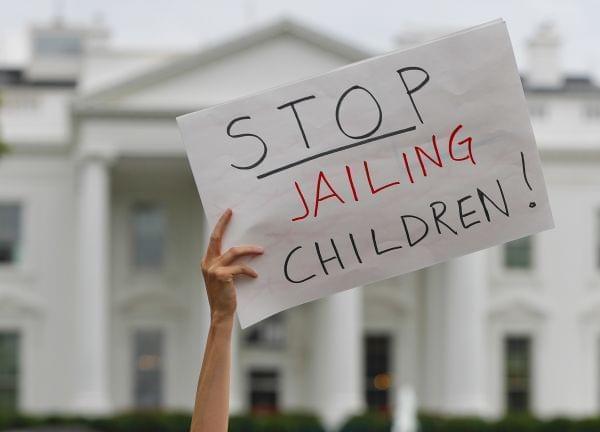Children Separated From Parents At Border Face Daunting Challenges

A demonstrator hold up a sign during a rally opposed to President Trump's family separation policy, in front of the White House in Washington, Thursday, June 21, 2018. Pablo Martinez Monsivais/AP
An advocate for children separated from their families under the Trump administration’s zero tolerance immigration policy says a lack of infrastructure and formal protocols make it hard to reunite families — despite an executive order from President Trump halting the practice.
Kelly Albinak Kribs is a staff attorney for the Young Center for Immigrant Children’s Rights in Chicago. The Young Center is the only organization in the country that the government has tapped to act as advocates for children being separated at the border from their parents when trying to enter the country.
Speaking on the public media talk show The 21st, she says the immmigration system isn't set up to meet the needs of the children needing care, and many show signs of stress and anxiety.
“There’s considerable evidence the separation of children from parents can have significant and lasting effects on their development for years to come," says Kribs.
Kribs says there are roughly 600 separated and unaccompanied immigrant children in 11 facilities across the Chicagoland area. Thousands across the country entered an immigration legal system that Kribs says treats everyone the same, no matter their age.
"A one-year old can be named a respondent in removal proceedings and have to go against an attorney from Homeland Security, which is kind of an absurdity," she says.
Kribs says the influx of children separated from their families is straining a system that’s already over-burdened and under-resourced.
Links
- Marches Planned To Protest Trump Administration’s Immigration Policies
- Migrant Children Relocated To Illinois; ‘Poster Children’ Are Back; Are There Wolves In Illinois?
- Trump Signs Order To End Family Separations
- Illinois Responds To Family Separation Policy; 11-Year-Old Cancer Survivor Gavin Waterman
- Executive Order Does Not Help Families Separated At Border, Said Durbin

